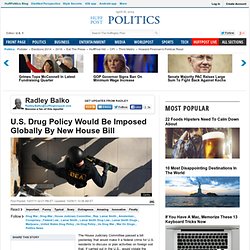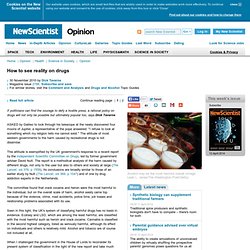

U.S. Drug Policy Would Be Imposed Globally By New House Bill. The House Judiciary Committee passed a bill yesterday that would make it a federal crime for U.S. residents to discuss or plan activities on foreign soil that, if carried out in the U.S., would violate the Controlled Substances Act (CSA) -- even if the planned activities are legal in the countries where they're carried out.

H.R. 313, the "Drug Trafficking Safe Harbor Elimination Act of 2011," is sponsored by Judiciary Committee Chairman Rep. Lamar Smith (R-Texas), and allows prosecutors to bring conspiracy charges against anyone who discusses, plans or advises someone else to engage in any activity that violates the CSA, the massive federal law that prohibits drugs like marijuana and strictly regulates prescription medication. The law could also potentially affect academics and medical professionals. For example, a U.S. doctor who works with overseas doctors or government officials on needle exchange programs could be subject to criminal prosecution.
It wouldn't be the first time. Global war on drugs has 'failed' say former leaders. 2 June 2011Last updated at 09:30 Opiate use rose by 35% worldwide from 1998-2008, in spite of anti-drug efforts The global war on drugs has "failed" according to a new report by a group of politicians and former world leaders. The Global Commission on Drug Policy report calls for the legalisation of some drugs and an end to the criminalisation of drug users. The panel includes former UN Secretary General Kofi Annan, the former leaders of Mexico, Colombia and Brazil, and the entrepreneur Sir Richard Branson. The US and Mexican governments have rejected the findings as misguided. The Global Commission's 24-page report argues that anti-drug policy has failed by fuelling organised crime, costing taxpayers millions of dollars and causing thousands of deaths. It cites UN estimates that opiate use increased 35% worldwide from 1998 to 2008, cocaine by 27%, and cannabis by 8.5%.
Cesar Gaviria said the US came in for criticism 'No harm to others' Continue reading the main story Analysis. How to see reality on drugs - opinion - 30 November 2010. Read full article Continue reading page |1|2 If politicians can find the courage to defy a hostile press, a rational policy on drugs will not only be possible but ultimately popular too, says Dick Taverne ASKED by Galileo to look through his telescope at the newly discovered four moons of Jupiter, a representative of the pope answered: "I refuse to look at something which my religion tells me cannot exist.

" The attitude of most western governments to the harm caused by recreational drugs is not dissimilar. The committee found that crack cocaine and heroin were the most harmful to the individual, but on the overall scale of harm, alcohol easily came top because of the violence, crime, road accidents, police time, job losses and relationship problems associated with its use. Seen in this light, the UK's system of classifying harmful drugs has no basis in evidence. Other countries have had similar experiences. Why do so many governments, including the UK's, continue to act irrationally?